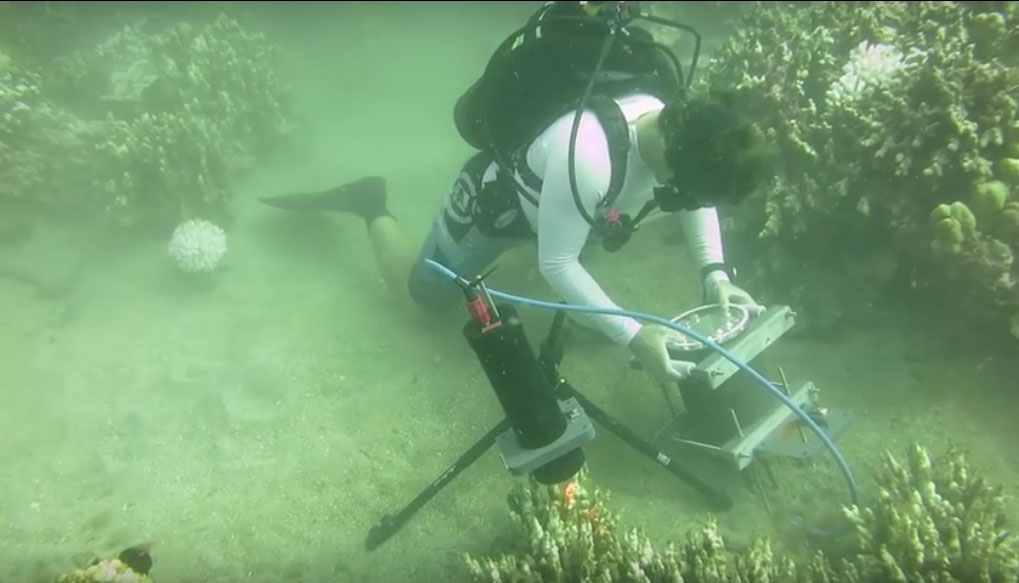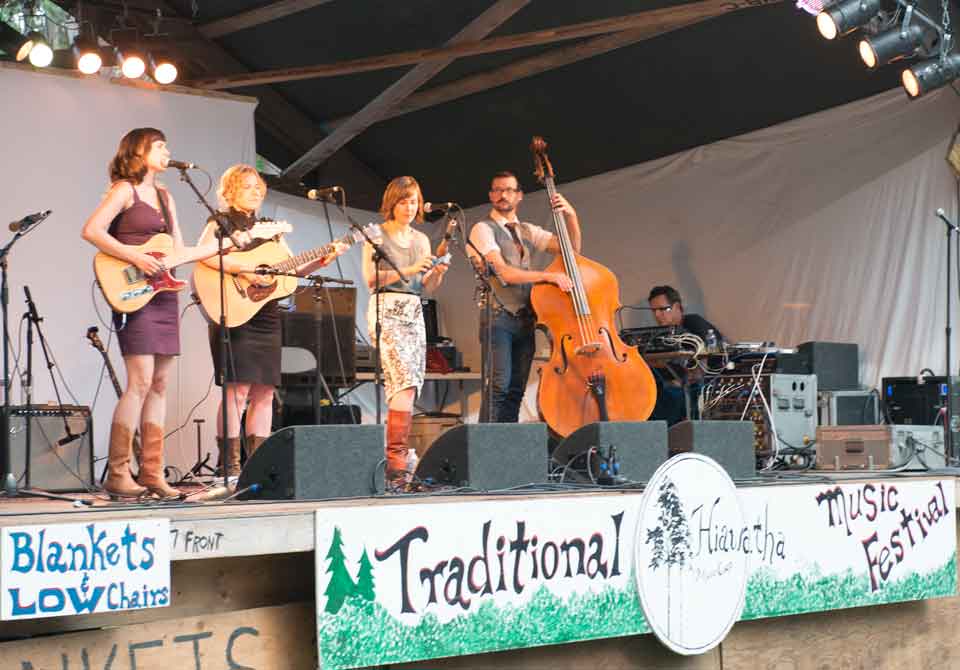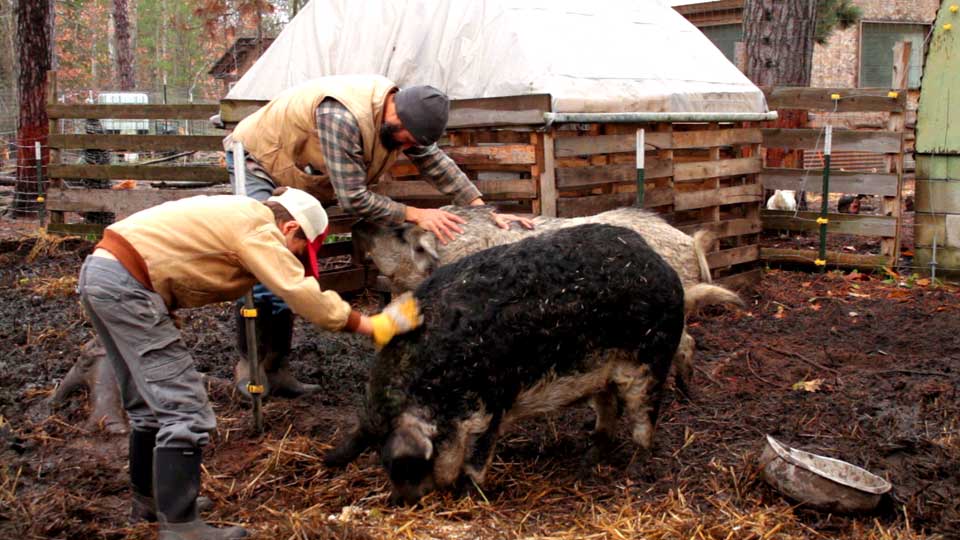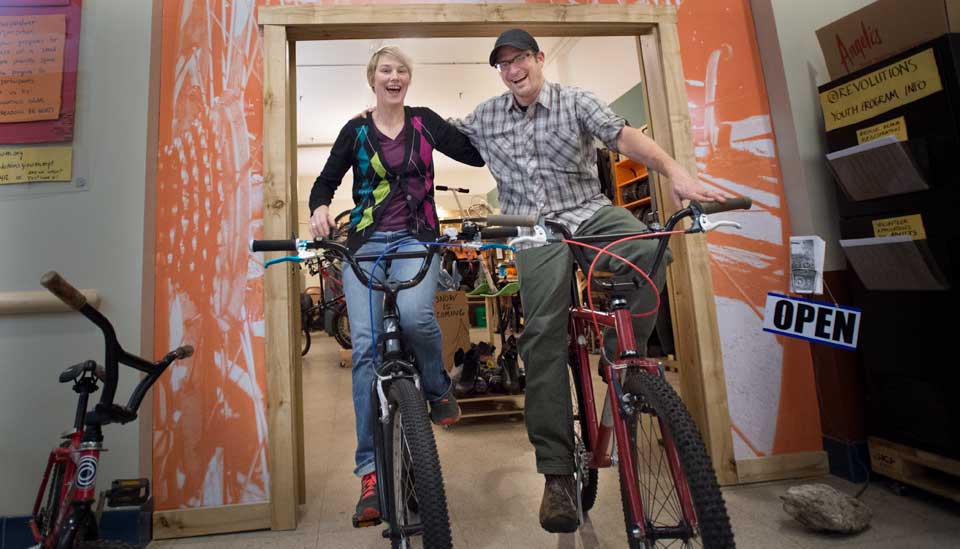STRAIGHTtalk: With Dr. Scott Doughty
Brian Cabell finds out why Dr. Scott Doughty of Harvey is not your traditional doctor. He’s an MD but he emphasizes a different, holistic approach to medicine and offers what’s known as “concierge” care.
BC: When did you get your first inspiration to become a doctor?

Dr. Scott Doughty M.D. stands next to the sign of his holistic medicine practice located just outside Marquette in Harvey, MI. (photo by Ron Caspi)
SD: My maternal grandmother was the daughter of a pharmacist, and she used to tell me stories about her father in his drugstore making medicines that doctors could use. I was fascinated with those stories. Then there was the time my sister got a nose bleed and I was the one helping my mom after she fainted and then I had to help my sister with her nose bleed. So there was a certain need there that occurred within the family.
BC: Did you get the sense that practicing medicine was your mission in life?
SD: I actually didn’t realize that I missed the mission on the first go-round, and if I had it to do all over again I probably would have gone into a more specific “natural” medicine career. But I’m glad I entered with this approach because it’s a great foundation to have the medical degree, but now I’m behind when I look around at other people who are doing things the way I’m doing them. I’m relatively new to the game of holistic or natural medicine.
BC: Let’s take a further look at your history. Before coming up here, you practiced in New Mexico.
SD: Yes, that was with the Zuni pueblo in the western part of the state. I went there on a rotation. When I was a resident here in Marquette (at Marquette General Hospital), I spent a month down there and made connections that, a couple of years later, when they were looking for a full-time doc to add to their staff, they interviewed me and hired me. We went there thinking we’d be there for two years and pay off some loans, have some great places to hike and maybe see some interesting Indian stuff. Well, it turned into ten years of tremendous, high quality personal and professional work. Ten thousand Zuni indians, another five thousand Navajos from surrounding areas, and we were it. The only doctors. The closest hospital was 35 miles away and so when somebody came in with either a trauma or the need to have a baby, we were it. We were the ER doctor, we were the obstetrician, we were the ones seeing patients at the office, and then we were also living among the people.
BC: Sounds like it was challenging.
SD: It was incredibly challenging and gratifying. I was called one night by one of my colleagues who said a lady had just walked in with no prenatal care and she was about to have a baby, and it was twins. And this doctor didn’t do OB, he was an internist. I was his backup so I went in there and had never done that before without an obstetrician in the room or down the hall, so…it was incredibly gratifying professionally. When we left there after ten years, the Zuni tribal council had us down there to one of their sessions to just express their appreciation for us and our work. Amy (his wife, a nurse and midwife) and I truly could have said that day that we didn’t need to work anymore because the degree of appreciation that was showered on us by the Zuni could never be matched anywhere else.
BC: Why’d you come back to the U.P.?
SD: It was the first home we’d had after we married and moved here in 1992. Our hearts were certainly still here and I maintained connections with the folks involved with the residency and the medical school here, and I was invited to come back and join the faculty.
BC: So you spent seven years here teaching and also seeing patients. Did that change the way you thought of practicing medicine?
SD: It definitely did. When I had worked down in New Mexico, it wasn’t private medicine. I never saw a drug rep in ten years. We were academically practicing medicine as well as that can be done without the influences of the industry. We had a strict budget so we had to make good decisions. We were also in the fortunate position of not having to fear lawsuits so we didn’t have to give everybody the CT scan and the MRI. We were comfortable saying “You don’t need that.” But then I came back here and we were bombarded with pharmaceutical reps, with defensive medicine, and with people getting side effects to medicines that then had to get treated with more medicines, and I just thought, “Whoa, ten years out of this game, and medicine has changed.” You had to be an expert on the side effects of medicines so that you could give more medicines. I didn’t like that. That’s when I started looking at integrative or holistic medicine.

BC: So you adopted a holistic approach to medicine, but you also started a “concierge” practice in which you charge patients a flat fee for the year and allow them unlimited visits, but your fee is not covered by insurance. Why that approach?
SD: I longed for simplicity and it was clear to me that the insurance involvement with the direct care that I wanted to provide was not going to be adequate for me to get paid for what I was doing, nor did I see it as a means to making the path easier for my patients. This came home to me when I would do my clinical work in Marquette. Nearly every encounter involved either what the insurance company had communicated to me or the patient, or what kind of bill the patient was getting stuck with. The insurance company, not the doctor, made the decisions. So I knew, when I decided to leave the system and go into my own practice, that that would be a recipe for frustration if I included the insurance companies in the conversation.
BC: You’ve been doing it for nine months. How has it worked out so far?
SD: I’m paying myself, I’m paying two employees, I’m paying my bills. I’ve taken a small pay cut so far but that will probably change.
BC: Less stress?
SD: Totally less stress, but a different kind of stress. Now, when something happens to one of my patients, I am it. I can’t say, “Well, at 5 o’clock, Dr. So-and-So will take over for me and he’ll take care of you.” So there’s a new kind of stress. A new responsibility.
BC: Are there any drawbacks to concierge medicine that you’ve discovered so far?
SD: To me, it’s been all good. It’s given me a mental freedom. I have time to look stuff up, I have time to develop new programs or offerings. I’m not drained, I feel energetic every day.
BC: Let’s talk about your patient load. How many patients do you have and what kind of time do you spend with them?
SD: We have about 235 patients on the concierge plan ($1500 dollars for unlimited visits for a >> year) and then I see another 100 patients for individual visits. I usually see between 7 and 10 patients per day. On their first visit, my patients typically spend an hour or two filling out a detailed questionnaire before we even meet, and then when I go into the room to meet them, I’ve already spent 15 or 20 minutes going over the questionnaire, taking notes and coming up with additional questions that I want to ask. Then we spend an hour together on that first visit and discuss various holistic approaches and reach some agreement on what kind of testing makes sense. As test results roll in, then we have follow-up visits that are typically 45 minutes long.
BC: Now, you also practice holistic medicine. What exactly does that mean?
SD: Well, I think you could say that I’m open to the healing power of things besides just giving somebody a prescription for a medication.
BC: But you don’t preclude that?
SD: Oh no. I do write prescriptions, but I also look beyond that at other possible therapies.
BC: So let’s go down some of those treatments. Nutrition and supplements?
SD: Absolutely. that’s part of it.
BC: Acupuncture?
SD: I don’t do acupuncture, but I’m a believer in acupuncture.
BC: Homeopathy?
SD: I’m a believer in homeopathy but I don’t practice it in a traditional sense.
BC: Faith-healing?
SD: I’m a believer. Because that’s what works for some people. What I don’t like about traditional Western medicine is I don’t like the authority that doctors use that discounts what people know about themselves. So when somebody comes to me and says, “I think my hormones are messed up.” I don’t say, “Oh no, they’re not!” I say, “Let’s figure out what your hormones are up to, and see if there’s something we can balance.”
BC: What about Eastern medicine?
SD: Traditional Eastern medicine has helped millions of people. Just because it’s not from here doesn’t mean it doesn’t have validity.
BC: Meditation? Yoga?
SD: Absolutely. The science behind the benefits of meditation is better than it’s ever been.
BC: One more question. What’s your view of Obamacare?
SD: I loved Obamacare before I did this business because I thought it was a really bad idea to have millions of Americans without access to health care. However, If there wasn’t Obamacare, I’d be busier because now the people are forced to buy health insurance, and that gives them less money to spend on things they think would be pertinent for their health. I like Obamacare, but I just wish there was some way for patients to have more say in how they spend their health care dollars.
BC: Thank you, Dr. Doughty.














You must be logged in to post a comment Login